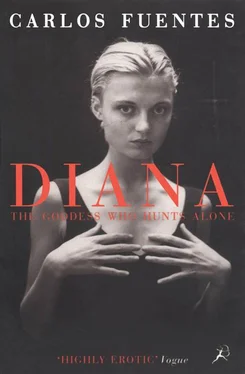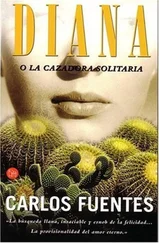Carlos Fuentes - Diana the Goddess Who Hunts Alone
Здесь есть возможность читать онлайн «Carlos Fuentes - Diana the Goddess Who Hunts Alone» весь текст электронной книги совершенно бесплатно (целиком полную версию без сокращений). В некоторых случаях можно слушать аудио, скачать через торрент в формате fb2 и присутствует краткое содержание. Год выпуска: 2012, Издательство: Bloomsbury UK, Жанр: Современная проза, на английском языке. Описание произведения, (предисловие) а так же отзывы посетителей доступны на портале библиотеки ЛибКат.
- Название:Diana the Goddess Who Hunts Alone
- Автор:
- Издательство:Bloomsbury UK
- Жанр:
- Год:2012
- ISBN:нет данных
- Рейтинг книги:3 / 5. Голосов: 1
-
Избранное:Добавить в избранное
- Отзывы:
-
Ваша оценка:
- 60
- 1
- 2
- 3
- 4
- 5
Diana the Goddess Who Hunts Alone: краткое содержание, описание и аннотация
Предлагаем к чтению аннотацию, описание, краткое содержание или предисловие (зависит от того, что написал сам автор книги «Diana the Goddess Who Hunts Alone»). Если вы не нашли необходимую информацию о книге — напишите в комментариях, мы постараемся отыскать её.
Diana the Goddess Who Hunts Alone — читать онлайн бесплатно полную книгу (весь текст) целиком
Ниже представлен текст книги, разбитый по страницам. Система сохранения места последней прочитанной страницы, позволяет с удобством читать онлайн бесплатно книгу «Diana the Goddess Who Hunts Alone», без необходимости каждый раз заново искать на чём Вы остановились. Поставьте закладку, и сможете в любой момент перейти на страницу, на которой закончили чтение.
Интервал:
Закладка:
But that a white woman might be the matriarch of the light-brown world, might populate the forests of the New World, the American utopia, with degraded mestizo bastards — no, that repelled even the most liberal conscience, that went to the very center of the Yankee heart, stirred up the guts and balls of Yankee decency. The child had to be black, the offspring of a black revolutionary and a frivolous, crazed white actress. If not, it would mean total horror. The white woman was the slave of the black.
The FBI is patient. It waited until Diana’s pregnancy was obvious. Approval of the defamation plan went along these lines: Diana Soren has provided financial support to the Black Panther Party and must be neutralized. Her current pregnancy by [name blacked out] gives us the opportunity to do so.
The Bureau proceeded in the following manner. Agents planted a rumor with Hollywood’s gossip columnists. They circulated a letter signed by a fictitious person: “I’ve been thinking about you, and I remembered that I owe you a favor. Imagine, I was in Paris last week and by accident I ran into Diana Soren, so pregnant she’s as big as a house … At first I thought she’d gotten back together with Ivan, but she told me that the father is [name blacked out] of the Black Panthers. That girl sure gets around, as you can see. In any case, I wanted to give you first shot at this one …”
Hollywood gossip columns began to repeat the rumor: “The top item in today’s news is that Miss D., the famous actress, is expecting. The proud papa is supposed to be a prominent Black Panther.” The news spread, scaled the heights of credulity, won more converts than the Bible, and was consecrated in an American news weekly with a worldwide circulation — in fact, it is so well distributed that it was one of the two magazines you could get at the drugstore in the Santiago town square, the place where I’d gone to buy toothpaste and where a young student approached me with an invitation to speak to his group …
“Excuse me,” I said then (I laugh at myself today), “but I don’t want to compromise my North American friends. I’m their guest.”
The magazine was the first to mention Diana’s name. She and Ivan sued them for libel and won something like ten thousand dollars.
The next thing I learned was that Diana had given birth prematurely by cesarean section and that the baby had died after three days.
The next week she flew from Paris to Jeffersontown to bury it. She displayed the body in a funeral parlor. The entire town marched around the coffin, eager to verify the color of the baby’s skin.
“It isn’t white.”
“It’s not black, either. The features aren’t black.”
“You can never tell with a mulatto. They’re tricky.”
“How can you know if this is really Diana’s baby? A black fetus is the easiest thing to throw in the garbage.”
“Do you mean she bought the body of a white baby just to bring it here for us to see?”
“How much would that cost?”
“Is it legal?”
“You look at that baby carefully. It’s white.”
“But with a touch of the tar brush. Don’t kid yourself.”
“So who’s the father?”
“Her husband says he is …”
That sent the line of curious spectators into waves of laughter.
Diana Soren paid no attention. She was too busy taking photos of the tiny body in the white coffin. She took 180 photographs of the dead child.
XXXII
At the end of the 1970s, I met Ivan Gravet in Holland. We’d both been invited to spend a long weekend in the country at the castle of our mutual friend Gabriella van Zuylen. Gabriella is a charming, very beautiful woman, a lover of gardens and a friend of Russell Page, the magnificent British park designer, about whom she wrote a monograph.
The castle is an impressive pile, especially because in Holland’s flat landscape it stands out like a mountain. Gabriella has dedicated herself to extending, completing, and beautifying the tranquil, bovine Dutch landscape with the mystery of nature as conceived by the baroque imagination — contrived, varied, circular.
Among the curiosities of her garden was a labyrinth of very high hedges whose perfectly geometrical form, as regular as a botanical spiral, could only be appreciated fully from the roof of the castle. But if you were inside the maze, you quickly lost any sense of its form, and lost your way as well. Sooner or later, Gabriella’s thirty guests all explored the maze and all got lost until she came to our rescue, laughing.
My wife, who’s afraid of spaces without exits, refused to go in the maze and went off with Gabriella to the Frans Hals Museum in Haarlem. I ventured in, willfully desiring to get lost. First of all, I wanted to play along with the maze’s intention. Secondly, I was convinced that to enter the maze with the goal of getting out was obviously how you’d become the prisoner of the mythic bull who inhabits it. But if you got lost, losing the will to survive, it would please the Minotaur, make him your ally, allay his suspicions. That’s how Theseus should have proceeded.
I did not have Ariadne’s thread. But when I suddenly found myself face-to-face with Ivan Gravet inside the maze, I decided that Diana Soren was the thread on which, in a certain way, both of us were relying at that moment — only at that moment. I’d seen him, of course, since Friday, at Gabriella’s magnificent dinners and lunches. At night, we were supposed to wear evening clothes, and Ivan was the sole exception, wearing a jacket I can only compare to those I saw in photos of Stalin or Mao: a gray tunic with very long sleeves, buttoned to the neck and worn without a tie. It wasn’t what was then called — during an attack of Third World fashion — a Mao or Nehru jacket. Ivan Gravet’s tunic looked as if it had either been bought in the GUM store in Red Square or been handed on from some member of the Politburo. The last time I’d seen one like it was in a photograph of the justly forgotten Malenkov. Khrushchev wore only suits and ties. In Ivan Gravet’s outfit — which he didn’t change the whole three nights we spent at the castle — there was nostalgia for a lost Russian world; there was humor, but there was also mourning…
We laughed when we met. We couldn’t have spoken any other way, said Ivan. Why? I asked; I’ve never said anything, no one would connect us. We’re in another country, I added brutally, and besides, the wench is dead. I was curious to know more, but I also wanted to force Ivan to react within the brief time we had in the maze. How strange: I felt that both of us ascribed less importance and devoted less time to this labyrinth, created to capture forever those who venture into it, than we did to going through customs at an airport.
“It’s that you didn’t know the difficulty of loving a woman you can’t help, change, or leave,” he said.
I agreed. Diana was part of a past that no longer concerned me. For eight years, I’d been living with my new wife, a healthy, modern, active, beautiful, and independent woman. We had two children and a loving sex life in which we treated each other with respect without submitting to each other, aware that the continuity of our relationship depended on our never taking it as something certain, customary, given, with no effort on our part.
Far from Diana, far from my past, I still felt close to the literary joy I’d recovered. I did not burn the pages I’d written in Santiago with Diana at my side, but I had leapt from them, with more strength and conviction than ever, to the work that was waiting for me, that summoned me, and that gave me the greatest happiness in my life. I hadn’t wanted to finish writing it. No novel gave me so many intelligent readers, readers who were close to me, who were permanent, who mattered to me … With that novel, I found my real readers, those whom I wanted to create, discover, keep. Those who, like me, wanted to discover the figure of greatest essential insecurity — not worn-out psychologies but helpless figures developing at another level of communication and discourse: language, history, epochs, absences, nonexistences as characters, and the novel as the meeting place of times and beings that would never otherwise encounter one another.
Читать дальшеИнтервал:
Закладка:
Похожие книги на «Diana the Goddess Who Hunts Alone»
Представляем Вашему вниманию похожие книги на «Diana the Goddess Who Hunts Alone» списком для выбора. Мы отобрали схожую по названию и смыслу литературу в надежде предоставить читателям больше вариантов отыскать новые, интересные, ещё непрочитанные произведения.
Обсуждение, отзывы о книге «Diana the Goddess Who Hunts Alone» и просто собственные мнения читателей. Оставьте ваши комментарии, напишите, что Вы думаете о произведении, его смысле или главных героях. Укажите что конкретно понравилось, а что нет, и почему Вы так считаете.












